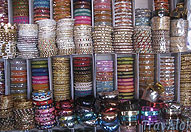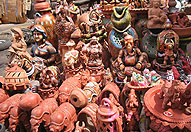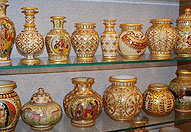Jaipur is a shoppers' paradise.

The builders of Jaipur took special care to provide ample space and facilities for
the production and marketing of handicrafts which made the place famous throughout
India and abroad. An entire street and several city sectors were earmarked for artisans
and traders. The main markets are along Jauhari Bazar, Bapu Bazar, Nehru Bazar,
Chaura Rasta, Tripolia Bazar and M.I. Road. Shops specialising in precious and semi-precious
stones, ornaments and jewellery are to be found on and along Jauhari Bazaar. Jaipur
enjoys a high reputation for the manufacture of jewellery. It is one of the most
active jewel markets of the world and is famous for precious and semi-precious stones
and also for the cutting, polishing and setting of these stones, particularly that
of diamonds, topaz and emeralds. Jaipur brass work is of immaculate quality. The
Jaipur brass worker is successful in infusing life like charm into the dull metal.
Two kinds of work is done in Jaipur on brass viz., lacquered brass and carved brass.
Jaipur enamel or Minakari, mostly done on gold and silver has always been a class
of its own. The Jaipur artist is renowned not only for the purity of the colours,
but also for its evenness.

Jaipur is also famous for its textiles. Sanganeri and Bagru block prints are the
fashion designer's craze these days. The Bandhej (tie and dye) print is very typical
of the region. Near the HawaMahal are large numbers of shops dealing in antiques
and pseudo-antiques. Some shops opposite HawaMahal stock the famous Jaipuri quilts,
weighing from a few hundred grams to a kilogram. The stone and marble carving industry
is also a famous art of Jaipur. The stone used is either procured from within Jaipur
or from the marble mines of Makrana, the famous quarry that provided all the marble
stone for one of the wonders of the world at Agra the TajMahal The carvings portraits
and busts created in Jaipur are held in high esteem everywhere.
Jauhari Bazar Jaipur
This is where you can buy jewellery and tie and dye sarees, two lanes joining the
main road - Gopaljika Rasta and Haldionka Rasta house numerous establishments selling
jewellery. On the main road itself you find many silversmiths. Traditional tie and
dye fabrics and textiles are also available here. Bapu Bazaar and Nehru Bazaar Jaipur
- Here you can purchase textiles, local perfumes and shoes made of camel skin. MirzaIsmial
Road Jaipur (MI. Road) - The broad thoroughfare houses a large number of emporia
selling a variety of goods ranging from jewellery and brass work to textiles, to
blue pottery, to woodwork, etc. These shops stock a large variety of goods to satisfy
the tourists' needs. Tripolia Bazar and Chaura Rasta Jaipur - You can shop here
for textiles, utensils, ironware and trinkets. If you want to see the artisans at
work, step into the side lanes and








